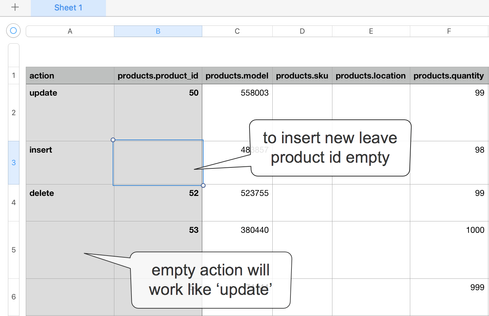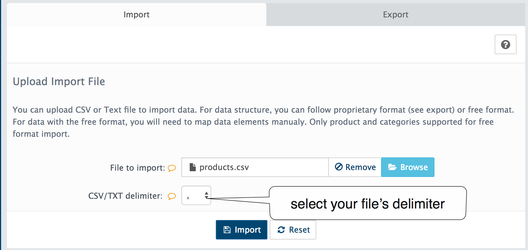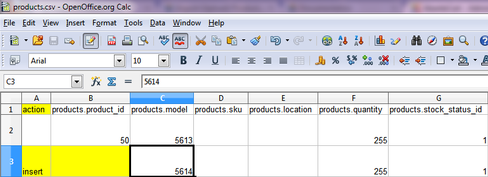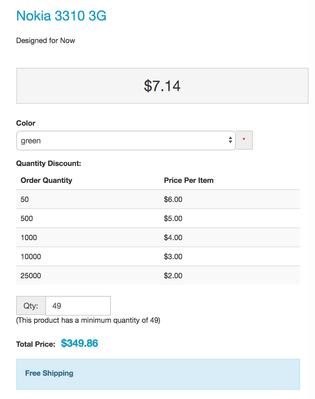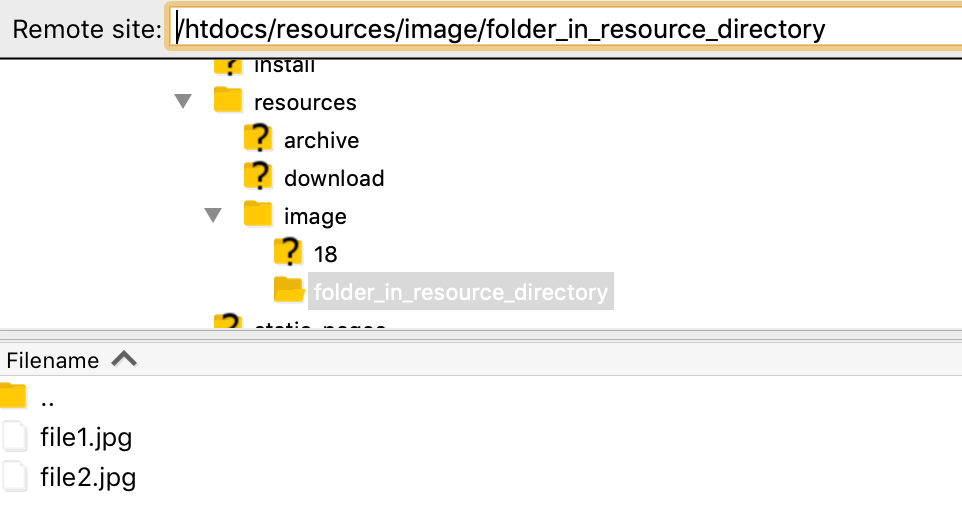Import
Data upload is a significant and at the same time risky operation, you should consider a couple of things before starting the import process:
- backup the database
- product import success depends on the file, that undergoes data transfer. What fields are included and how information is organized really matters
- new products won’t be added to the database until all the required fields are included in the file
Import Format Difference
In AbanteCart you can choose between native import format (strict) and free format (flexible).
This article describes import with the native AbanteCart format. If you are looking for a more simplified (but less controlled) way to import please try the easy-to-use free import format with Import Wizard tool.
pros
control all values
control all languages
control all stores
can import orders, customers
cons
linking between objects by IDs - for example, you need to import categories first then find categories IDs and only after import products with categories ID's. Same with brands, stores, etc
a lot of columns to edit
if one column name incorrect it will be ignored
pros
no IDs required - simply type names to add
fewer columns to edit - you can set multiple categories or image URLs in one
select columns meaning to be recognized as
preview first row of the imported file
you can import product almost from any data format
JSON maps support - reusable Configurations
cons
import to only one language and store
not everything can be added (for example you can not add tags)
can not import orders, customers
Action Insert or Update
When using the native format, if you import data with table columns that have auto-increment indexes (e.g., product_id), the default action will be to update existing records. If you need to add new entries with auto-increment column values, you must explicitly specify the action as insert. To do this, add a new column labeled action to your CSV file and set its value to insert for each new entry.
in the same way, you can bulk remove products with action delete
Note: Ensure that the column name action is in lowercase and contains no spaces.
CSV editor tips
When working with CSV files for importing data into AbanteCart, it’s essential to use an editor that preserves data accuracy. Be aware that some editors, such as Microsoft Excel, may modify cell formats, for example, converting dates to its internal format or altering numeric delimiters (e.g., switching a period . to a comma , in prices) based on the system’s locale settings. This can lead to unintended errors, such as prices being imported incorrectly. For this reason, it’s recommended to use the price format 19.99 to avoid accidental editor conversion to formats like 19,99
Apple’s Numbers software mostly correctly opens CSV files but only allows saving them with a comma delimiter by default. You can use File → Export To → CSV to save your work in the required format. OpenOffice is another reliable tool with useful features for CSV editing. It allows you to set specific columns as text, preventing issues like leading zeros being removed (e.g., 00134 becoming 134). However, when opening your CSV file in OpenOffice, ensure to select only one delimiter (e.g., a comma) and avoid using combined delimiters, as this can cause compatibility problems.
Example 1: Update products
In this example we will show how to easily update your existing products.
First export one or all products. Go to System → Data → Import/Export. In the Export Tab find Products, click to expand the table and select only product_descriptions table.
In the opened CSV file easy to update/edit this products fields:
products.model
products.quantity
products.price
products.weight
products.length
products.width
products.height
products.sort_order
product_descriptions[0].name
product_descriptions[0].description
Also, You can edit other fields. But You need to know your correct ids/values already existing in your data for this fields:
products.stock_status_id
products.manufacturer_id
products.shipping
products.tax_class_id
Then Import file. Go to System → Data → Import/Export. In the Import Tab select correct File to import and correct CSV/TXT delimiter. Click Import button.
After processing the message will be shown. Normally 0 errors should be displayed.
Example 2: Insert products
Before inserting a lot of new products just create a sample product in Admin → Catalog → Products with all fields you need.
Then export to CSV file. Make sure to select required tables like:
product_descriptions
products_to_categories
products_to_stores
or any other tables which one contain needed data for a configured sample product.
Then Import file. Go to System → Data → Import/Export. In the Import Tab select correct File to import and correct CSV/TXT delimiter. Click Import button.
See CSV (TAB delimited) examples for insert :
Example 3: Product minimum insert
Very minimum example
Very minimum CSV file with columns allowing you to insert product with basic settings like name, weight, price, description, blurb, category id to assign, store id, tax class, quantity etc
products minimum CSV TAB delimited example abantecart_import_minimum.csv
In this example you can see some very important columns like products_to_stores[0].store_id
For most cases it is 0 (unless you have multiple stores).
products_to_categories[0].category_id is required to assign product to a storefront category.
Example 4: Insert products with Images
upload images by FTP to this path ../resources/image/somefolder/
permission for this folder to 777 (or 755)
change/add these columns in your CSV file
resource_map[0].resource_id = leave empty
resource_map[0].object_name = products
resource_library[0][0].type_id = 1
resource_descriptions[0][0][0].language_id = 1 (the id of installed language)
resource_descriptions[0][0][0].name = anyname (usually imagefile name)
resource_descriptions[0][0][0].title = leave empty or fill if you need title
resource_descriptions[0][0][0].description = leave empty or fill if you need description for the resource
resource_descriptions[0][0][0].resource_path = somefolder/product_image_1.jpg
in case You have 2 languages installed in your cart add the next columns
resource_descriptions[0][0][1].language_id = 9 (the correct id of second installed language)
resource_descriptions[0][0][1].name = anyname (usually imagefile name)
resource_descriptions[0][0][1].title = leave empty or fill if you need it
resource_descriptions[0][0][1].description = leave empty or fill if you need it
resource_descriptions[0][0][1].resource_path = somefolder/product_image_1.jpg
------------------------------------------------------------------------------------
to add multiple images to one product please add more columns
resource_map[1].resource_id = leave empty
resource_map[1].object_name = products
resource_library[1][0].type_id = 1
resource_descriptions[1][0][0].language_id = 1 (the id of installed language)
resource_descriptions[1][0][0].name = sometext (any resource name to second image)
resource_descriptions[1][0][0].title = leave empty or fill if you need it
resource_descriptions[1][0][0].description = leave empty or fill if you need it
resource_descriptions[1][0][0].resource_path = somefolder/product_image_2.jpg (path to second image)
same for second language if you have it installed
resource_descriptions[1][0][1].language_id = 9 (the correct id of second installed language)
resource_descriptions[1][0][1].name = sometext (any resource name to second image)
resource_descriptions[1][0][1].title = leave empty or fill if you need it
resource_descriptions[1][0][1].description = leave empty or fill if you need it
resource_descriptions[1][0][1].resource_path = somefolder/product_image_2.jpg (path to second image)
---------------------------------------------------------------------------------------
and to add one more image
resource_map[2].resource_id = leave empty
resource_map[2].object_name = products
resource_library[2][0].type_id = 1
resource_descriptions[2][0][0].language_id = 1 (the id of installed language)
resource_descriptions[2][0][0].name = sometext (any resource name to 3rd image)
resource_descriptions[2][0][0].title = leave empty or fill if you need it
resource_descriptions[2][0][0].description = leave empty or fill if you need it
resource_descriptions[2][0][0].resource_path = somefolder/product_image_3.jpg (path to second image)
resource_descriptions[2][0][1].language_id = 9 (the id of second installed language)
resource_descriptions[2][0][1].name = sometext (any resource name to 3rd image)
resource_descriptions[2][0][1].title = leave empty or fill if you need it
resource_descriptions[2][0][1].description = leave empty or fill if you need it
resource_descriptions[2][0][1].resource_path = somefolder/product_image_3.jpg (path to second image)
Example 5: Import Resources by URL
change/add this columns in your csv file
resource_map[0].type = image
resource_map[0].source_url = http://www.abantecart.com/images/devices.png
resource_map[0].source_path = leave empty
resource_map[0].html_code = <i class="fa fa-optin-monster"> (if you want to add html resource or leave empty)
------------------------------------------------------------------------------------
to add multiple images to one product please add more columns
resource_map[1].type = image
resource_map[1].source_url = http://www.abantecart.com/images/banners/admin_iphone.jpg
resource_map[2].type = pdf
resource_map[2].source_url = http://www.pdf995.com/samples/pdf.pdf
You can and more and more images for one product in a similar way
Example 6: Insert Product with Option and quantity pricing
You can and more product rows
product-insert-quantityprice.csv
Example 7: Update Product (add images to product)
You can and more product rows. The attached example is TAB delimited CSV file update_product_with_images.csv
1. put your images to resources/image/folder_in_resource_directory
2. please use the attached TAB delimited CSV file as an example of how to update products (add resource image to products)
3. In the CSV file double-check you set a valid product id (first column) and the path to the image file (last column).
4. When import, make sure to select the correct delimiter!
More Examples
Download New Products Example (insert)
Download Update Products Example (update)
Related content
AbanteCart, all rights reserved. 2025 ©
